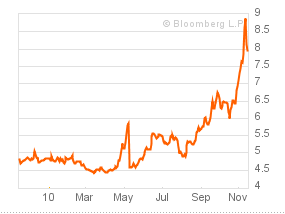Irish 10yr yields continued to drop (7.96%) on rumors the country will be forced to accept a bail-out. Other peripheral Euro-zone members, like Portugal, have suffered under contagion effects and want the Irish to end the crisis.
 Irish 10-year government bond yield. Source: Bloomberg.com
Irish 10-year government bond yield. Source: Bloomberg.com
According to The Guardian, Portugal, Spain and the ECB have given the Irish government a 24-hour ultimatum to seek EU / IMF financial help. EU finance ministers will hold emergency talks on Tuesday night.
Why not accept a bail-out? First, it is humiliating and likely to bring political damage upon the ruling party. Second, a bail-out would come at a certain price. EFSF (European Financial Stability Fund) loans could carry interest rates of up to 8%. This would enshrine current rates in the secondary market (which you want to avoid as an issuer – subsequent bond issues will be more difficult to sell if they carry lower coupons). A bail-out will settle the country with even more debt. EFSF/IMF debt will not be subordinated to existing debt, hence “diluting” the seniority of existing bond holders. Future bond sales to private investors will be made even more difficult.
How could Ireland be forced to accept a bail-out? Very easy. The ECB could limit the amount of financing (currently EUR 130bn or more than 80% of GDP) Irish institutions can get. Irish banks would be bankrupt immediately.
A bail-out could amount to EUR 80-100bn (slightly less than Greece’s EUR 110bn). I would expect an announcement by Wednesday morning.
